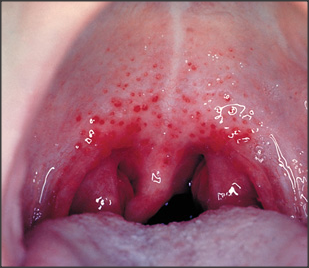The soft tissues at the back of your throat, which are commonly known as your tonsils, are an important component of your immune system. These lymphoid tissues can be easily get inflamed (a condition called tonsillitis) and cause symptoms like sore throat and fever. Although this is quite common, especially in children, recurrent tonsillitis can be a problem that affects your lifestyle. Learn more about what happens when you have on and off tonsillitis.
Recurrent Tonsillitis in Adults and Children
 Tonsillitis is a common condition that often affects children, and occasionally some adults. It usually goes away with minimal treatment and is not a serious disease. However, in some people, inflammation of the glands occurs more often than usual. Some children get multiple attacks in a year, which can be considered as recurrent tonsillitis by doctors. Adults are more likely to havechronic tonsillitis.
Tonsillitis is a common condition that often affects children, and occasionally some adults. It usually goes away with minimal treatment and is not a serious disease. However, in some people, inflammation of the glands occurs more often than usual. Some children get multiple attacks in a year, which can be considered as recurrent tonsillitis by doctors. Adults are more likely to havechronic tonsillitis.
Recurrent tonsillitis in children is often caused by streptococcus pyogenes (strep throat); while other forms of bacteria are more likely to be involved in adults' recurrent tonsillitis. For children, recurrent tonsillitis can also have a negative effect on their development.
Such an infection may initially improve with antibiotic treatment, but some people get frequent infections throughout the year. Reasons for recurrence of infection include a weakened immune system, resistant bacteria, or having a family who is a strep carrier.
How to Know If You Have Recurrent Tonsillitis
You are likely to be diagnosed as having recurrent tonsillitis if you experience one or more of the following conditions:
- At least 7 episodes of tonsillitis in the preceding year
- At least 5 episodes per year in the last 2 years
- At least 3 episodes per year in the last 3 years
When to Seek Medical Help
There are certain conditions you need to call your doctor right away. These include:
- Having fever, cannot eat/drink due to pain, and in a very weak or tired status
- Voice changes, or cannot speak properly; Has trouble opening mouth
- Having increased pain or swelling in the jaw
- Stiff neck, a rash and a swollen tongue
- Having not urinated for 12 hours
- Paused breathing while sleeping
- Symptoms don't get better, or get worse
When Should Tonsillectomy Be Performed?
Some doctors recommend surgical removal of the tonsils (tonsillectomy) in patients who have recurrent tonsillitis in spite of adequate medical treatment. A tonsillectomy may be recommended if you or your child has:
- Recurrent tonsillitis with high temperature, pain and discomfort
- Chronic tonsillitis not responsive to antibiotics
- Breathing difficulties associated with enlarged tonsils
- Frequent ear infections
- Peritonsillar abscesses (quinsy)
- Difficulty in swallowing, resulting in poor growth
Other Preferable Treatments for Kids with Recurrent Tonsillitis
Aside from tonsillectomy, other options for treatment of recurrent tonsillitis include:
- Acetaminophen to reduce fever and pain. This is available over the counter. Follow directions for proper use.
- NSAIDs like ibuprofen to decrease fever, swelling, and pain. They are also available without a doctor's prescription, but be sure to read the label and follow directions.
- Antibiotics can be used to control bacterial infection. This is usually prescribed by a doctor. They should be applied under your doctor's directions, and you should always finish the treatment course.
Home Care Options for Your Child
- Rest and diet tips: Ensure enough rest for your children. And encourage him to eat and drink more by offering cold liquids, ice cream, and soft foods. Avoid dehydration by increasing fluid intake.
- Salt water solution: Teach your child to gargle warm salt water solution. Mix one teaspoon of salt in 8 oz. warm water. Use this frequently to relieve throat pain and discomfort.
- Avoid spreading: Prevent spreading germs by washing your child's hands and your hands often. Avoid sharing food or drinks. Allow your child to return to school when his fever has gone for 24 hours and he feels better.
How to Prevent Recurrent Tonsillitis
Prevention is always better than fighting against the illness after it occurs. As mentioned above, you can practice good hygiene and gargle with saltwater to prevent recurrent tonsillitis. In addition, you can reduce your likelihood of acquiring recurrent infections by doing the following:
1. Purify and Humidify the Air
Avoid smoking or exposure to cigarette smoke and other airborne irritants, including strong chemicals and vapors. Use a humidifier to add moisture to the air in your home. This will help decrease throat irritation and dryness.
2. Get Plenty of Rest and Fluids
It is important for you or your child to get plenty of rest to avoid recurrent tonsillitis. Avoid using your voice often while your sore throat heals. Drink more fluids, especially when it is difficult to tolerate solid foods. Good nutrition is important for recovery from infection because it helps maintain your immune system function.
3. Avoid Sharing Food and Drinks
Germs can spread through saliva, so it is important not to share food, drinks, or utensils. Getting germs from the air is often unavoidable, but getting them from things like shared glasses or utensils can be easily avoided. Try not to spread infection by using common things, even with your child.
